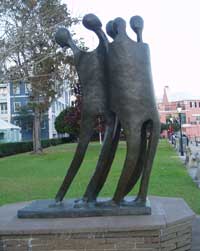
Above, Chesley Trott's Barrs Bay Park scuplture, 'We Arrive', marks the Enterprise episode.
| Community leader and businessman Richard Tucker played a major role in securing freedom for 72 American slaves who were aboard a ship that landed in Bermuda after encountering stormy weather. His actions would have been remarkable in any era, but were even more so in the Bermuda of 1835. He was a black man with drive and vision, but had no legal training and was operating in a society where slavery had been abolished only seven months earlier. Yet he launched the legal action in Bermuda’s Supreme Court that brought freedom to the slaves. The episode began on February 11, 1835 when the Enterprise, a U.S. brig with 78 slaves on board, landed in Bermuda. The ship, which was on its way to Charleston, South Carolina from Alexandria, Virginia, had been blown off course. Bermuda’s authorities became immediately aware of the implications of slaves being in a country where slavery no longer existed and took steps to prevent the brig from leaving the next day as planned. Meanwhile, Tucker applied to the Supreme Court for a writ of habeas corpus to have them released. Tucker was operating in his capacity as president of the Young Men’s Friendly Institution, which he had founded on September 16, 1832. It was the first lodge or friendly society formed for black Bermudians around the time of Emancipation with the goals of uplift, self-development and financial support for members in need. Freedom The issue that Tucker’s legal action put before the court was the wishes of the slaves: did they desire freedom? On February 18, at a packed court hearing that lasted from 9 p.m. until midnight, Chief Justice Thomas Butterfield spoke to each slave, one by one. All but six, a woman and her five children, said it was their wish to remain in Bermuda. The 72 were released and began new lives in Bermuda. The Royal Gazette’s report of the case praised the role of Tucker’s Friendly Institution, which also took responsibility for those who were unable to find jobs right away. Besides the Chief Justice, other key figures in the case were Attorney General John Harvey Darrell, who collected $70 right after the court hearing to help the freed slaves get on their feet, and Hamilton Mayor William Cox, who put them up for the night in a unoccupied storeroom. Property Even before that victory, Tucker could count a number of achievements. He was born around 1786. Whether he was born free or a slave is not known, but he was a free man when he married Charlotte Bell, who was a slave, at St. John’s Church, Pembroke on December 11, 1830. It is likely that he was a business owner in 1829 because he rented commercial space that year. He was a property owner in 1835 and his assets, which included a house and a separate lot of land, were valued at £550. He was entitled to vote because he owned property and in 1837, he exercised that right, becoming one of the first blacks to vote in a Bermuda election. In November 1837, he opened an “eating house” on what is now Church Street in Hamilton, which was patronized by lodge members. By 1848, he was described in a newspaper account as a hotelkeeper. Library He was an active member of the Anglican Church for whom he raised funds and gave a memorial speech in 1843 on behalf of the “coloured population of Pembroke and Devonshire.” He was also vice-president of the Useful Knowledge Library, which was founded in 1843. Tucker’s son William Robinson Tucker made his mark as the first Bermudian, black or white, to be sent overseas by the Government for teacher’s training. He attended Battersea Training College in England, but died of tuberculosis in December 1848 at the age of 27 after his return to Bermuda. The record is silent on Tucker’s life after 1850, when he is listed in an almanac as an executive member of the Useful Knowledge Library, but Augustus Swan, who served with him on the Library’s executive, praised him in a letter to The Royal Gazette in May 1848. Swan wrote that the Young Men’s Friendly Institution that Tucker founded “never had a greater benefactor, a kinder friend nor a more uncompromising patron.”

|

